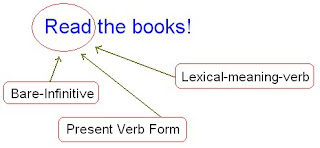Click Here to start to Learn English Grammar from the Step One (All Free for Beginner Only)
Now's time to speak up!
Why I point out Command expression as our first lesson in this Tutorial is because this sentence is the key of opening all grammar lesson in English. I have been doing intensive research and I would like to ensure that this lesson will be effective in learning online.
DEF. : Command expression is a context which is used to make someone or thing to do what we want.
There are two types of command :
1. Verbal Command
2. Nominal Command
Verbal command is a command which uses "Bare-Infinitive" in the beginning of this expression.
For examples:
Do it!
Come here!
Stand up!
Sit down!
Close the window!
Come on over!
Come back here!
Write the story!
Read the novel!
Come here!
Stand up!
Sit down!
Close the window!
Come on over!
Come back here!
Write the story!
Read the novel!
All expressions above describes the commands. The expressions are built by one core-element, that is, Bare-Infinitive (e.g. do, come, stand, sit, close, write and read, etc). Remember that bare-infinitive, here, is in Lexical-meaning-verb form.
So, there are three answers when someone asks us what kinds of verb must be used in building a command expression, in Verbal Command?
The answer should be:
1.Bare-Infinitive,
2.Lexical-meaning-verb, and
3.Present form verb.
2.Lexical-meaning-verb, and
3.Present form verb.
Study this follows!
Read the books!
/Read/ is a bare-infinitive. /Read/ is a lexical-meaning-verb. And, /Read/ is a present verb form.
When you answer is like that, no body will argue.
Nominal Command is a command which uses "BE" in the beginning of this expression.
Take notice that the /BE/, here, is not like /is, am, are, was, were, been, or even being. This /BE/ is a real kind of "BE".
For examples:
Be carefull!
Be deligent!
Be a man!
Be on time!
Be there immediately!
Be smart!
Be mine!
Be a good teacher!
Take notice that /Be/, here, needs a complement. A complement must be in Adjective, Adverb, Pronoun or Noun phrase form. On the other hand, you can place another except VERB.
Remember that /Be/ which is being used is a structural-meaning-verb not lexical-meaning-verb. This rule is a Must to obey!.
When someone asks us to do something, we sometimes feel lazy to do that. Make different!
Come here!
Come here, please!
Come here, please!
The two expressions looks the same. However, the word /please/ has created a new colour. When the word /please/ is placed there, the command becomes "Polite Command".
/Please/ can be used in the end or in the beginning of a command expression.
Come here, please!
or,
Please Come here!
Addition:
Beside the discussion above, we can make a command expression by using a word "MUST".
For examples:
you must come here on time.
You must tell me something.
Take notice that you should place Bare-infinitive after the word /must/.
We also can say :
You must be on time!
In the sentence above, there is /be/. The pattern of the expression is similar to the previous pattern.
LET'S PRACTISE THIS LESSON!
When you feel that you have already understood the pattern and how to build a command expression, now's time for you to practise it.
1. Make a short expression of command, e.g. Stop running!
2. Combine no (1) with the simple sentence, e.g. I want to inform you something. So, Stop running!
2. Combine no (1) with the simple sentence, e.g. I want to inform you something. So, Stop running!
When you feel that you can make the sentence (like : /I want to inform you something. So, Stop running!
/), try to place another. Then practise it orally. Find your best partner to practise it!.More sentences you make, More perfect you will get. Don't forget that you have to practise it regularly when you want something to do by your friend or someone else in English Language.
<<< Back Step-6 : ?..... Please visit me later ....!


